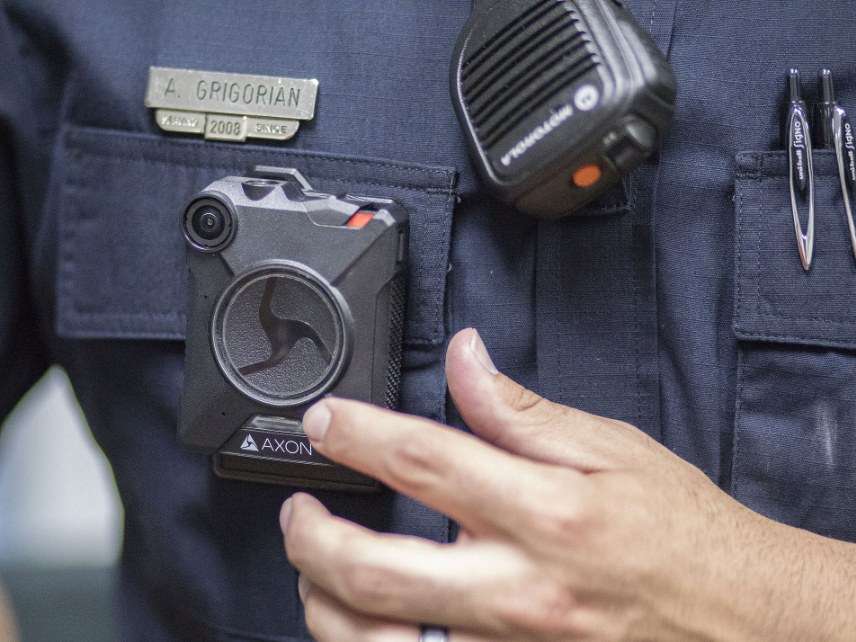Public Access to Police Videos Gets Support in California, New Jersey
Potential wins for transparency

A bill moving through the California legislature shows the right way to handle privacy concerns about police body camera footage: Require law enforcement agencies to make the case why recordings should be withheld from the public.
AB 748 approaches any police video or audio recording with the presumption that it is a public record, but it creates a system by which law enforcement may request to withhold access in limited situations.
Here are the bill's most important provisions:
- Police can request a recording be exempt for release for 90 days if disclosing it would impede an active investigation.
- Police can redact parts of a recording in cases where they might otherwise violate somebody's privacy.
- In a broader situation where they can't adequately redact a private person's identity from a recording but want to withhold it, they still have to release the recording to the person him or herself or the person's parents (in the case of children) or other family members.
- Recordings involving a police officer using force or that show a violation of law or government policy will be assumed to be "a matter of public concern."
The bill also prohibits the use of biometric programs and facial recognition software to process police recordings.
The Associated Press notes that many law enforcement agencies across the state oppose legislation that treat police recordings as public records. Many cities have enacted their own policies that state that police recordings are exempt from public records laws. This bill would overrule them.
The bill has already passed California's Assembly (77-0) and has moved into the Senate. It was approved by the Senate's Public Safety Committee on Tuesday. But as the AP points out, several past bills attempting to address police recordings as public records have failed.
Police lobbyists would prefer laws like the ones in Pennsylvania and North Carolina, which essentially do the opposite. These states generally exempt police recordings from public records laws; citizens there have to fight law enforcement agencies in the courts get access to them. Such systems get government transparency backwards: The assumption should be that the public ought to be able to see and evaluate police's behavior on the job.
In this case, in other words, it would actually be good if something originating from California's legislature were to become a trend.
It looks like New Jersey's Supreme Court agrees. The court ruled unanimously Tuesday that dashboard camera recordings that document deadly use of force by police officers should be made available to the public. The chief justice noted:
In the case of a police shooting, non-disclosure of dash-cam videos can undermine confidence in law enforcement and the work that officers routinely perform. It can also fuel the perception that information is being concealed—a concern that is enhanced when law enforcement officials occasionally reveal footage that exculpates officers.
In this case, the North Jersey Media Group had been demanding access to dash videos of an incident where police shot and killed a man suspected of stealing an SUV after a high-speech chase. A state court had ruled that that the police recordings were confidential investigative files not covered by state public records laws, and the New Jersey Supreme Court overruled part of that decision.
Editor's Note: As of February 29, 2024, commenting privileges on reason.com posts are limited to Reason Plus subscribers. Past commenters are grandfathered in for a temporary period. Subscribe here to preserve your ability to comment. Your Reason Plus subscription also gives you an ad-free version of reason.com, along with full access to the digital edition and archives of Reason magazine. We request that comments be civil and on-topic. We do not moderate or assume any responsibility for comments, which are owned by the readers who post them. Comments do not represent the views of reason.com or Reason Foundation. We reserve the right to delete any comment and ban commenters for any reason at any time. Comments may only be edited within 5 minutes of posting. Report abuses.
Please to post comments


RE: Public Access to Police Videos Gets Support in California, New Jersey
Potential wins for transparency
Those are two good places to start.
I wonder when NYC will implement that policy, if they haven't already.
What's the worry? I can't wait to see America's heroes in action.
Police can request a recording be exempt for release for 90 days if disclosing it would impede an active investigation.
IT ALWAYS WILL.
Police can redact parts of a recording in cases where they might otherwise violate somebody's privacy.
They won't want to violate your privacy as they post your mugshot on their Facebook page for last weekend's vice sting.
In a broader situation where they can't adequately redact a private person's identity from a recording but want to withhold it, they still have to release the recording to the person him or herself or the person's parents (in the case of children) or other family members.
If Fox could do it for Cops with 1990's technology, how difficult can it be?
Recordings involving a police officer using force or that show a violation of law or government policy will be assumed to be "a matter of public concern."
But will also be a personnel matter, and which do you think will have precedent?
What will the consequences when police departments ignore or violate the law?
Bueller?
mmmmmm cheeeeeeeese
A bill moving through the California legislature shows the right way to handle privacy concerns about police body camera footage: Require law enforcement agencies to make the case why recordings should be withheld from the public.
I'm guessing that won't be hard. Look how many cases we have of public records not being released because the agency or politician involved claims that there are "privacy concerns" without any further detail given.
Wonder how the courts will rule when the unions sue on grounds it violates union contracts?